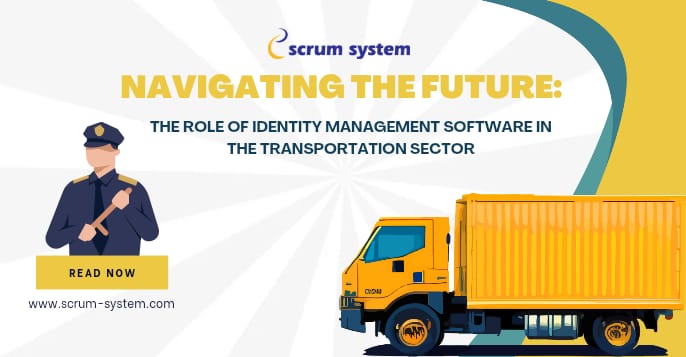Introduction:
In the ever-evolving terrain of the transportation sector, characterised by a relentless pursuit of efficiency and precision, the integration of advanced technologies has become not just a competitive edge but a strategic imperative. At the forefront of this technological revolution stands Identity Management Software (IMS), a linchpin that is reshaping the very fabric of how businesses orchestrate their operations, oversee their fleets, and manage their personnel.
In this blog, we embark on an exploration of the multifaceted role played by Identity Management Software, unravelling the transformative impact it has on the present and its instrumental role in shaping the future of the transportation sector. From streamlining vehicle identities to empowering drivers and embracing an inclusive approach to supporting staff, the influence of IMS extends far beyond its conventional functionalities, positioning itself as an indispensable catalyst for the industry’s evolution. Join us as we delve into the intricate layers of this technological marvel and uncover the pathways it paves towards a more efficient, secure, and future-ready transportation ecosystem.
The Evolution of Transportation Management:
The traditional methods of managing transportation operations have given way to sophisticated, technology-driven solutions. The need for real-time data, compliance with regulatory standards, and the optimization of resources has driven the adoption of Identity Management Software. This evolution is not just a technological upgrade but a fundamental shift in the way the transportation sector operates.
Streamlining Vehicle Identity:
Central to effective fleet management is the ability to monitor and control the diverse array of vehicles in operation. Identity Management Software employs cutting-edge technologies, including GPS tracking and telematics, to provide real-time insights into the location, performance, and status of each vehicle. This streamlines operations, improves route planning, and optimises fuel efficiency, ultimately contributing to a more sustainable and cost-effective transportation ecosystem.
Empowering Driver Identity:
Ensuring the safety and compliance of drivers is a critical aspect of transportation management. Identity Management Software facilitates the creation of comprehensive digital profiles for drivers, containing vital information such as credentials, certifications, and performance history. This not only ensures compliance with regulatory requirements but also enables proactive measures to address issues like driver fatigue, training needs, and behaviour monitoring.
Inclusive Approach to Khalasis:
The often-overlooked role of Khalasis in the transportation sector is an integral part of the overall logistics chain. Identity Management Software extends its capabilities to include the efficient management of Khalasis by creating digital profiles that encompass their skills, certifications, and work history. This inclusive approach enhances workforce planning, task allocation, and performance evaluation, contributing to a more cohesive and productive team.
Integration for Operational Harmony:
A hallmark of modern Identity Management Software is its ability to seamlessly integrate with other systems and technologies. Integration with Enterprise Resource Planning (ERP) systems, warehouse management solutions, and customer relationship management tools enhances the overall efficiency of transportation operations. This operational harmony ensures a unified flow of information across different departments, fostering better decision-making and responsiveness.
Security and Compliance Imperatives:
The transportation sector operates in a highly regulated environment, necessitating robust security measures and strict compliance. Identity Management Software plays a pivotal role in ensuring data security and adherence to industry regulations. By centralising and securing sensitive information, these solutions help transportation companies meet privacy laws, data protection regulations, and safety standards, instilling trust among stakeholders.
Real-Time Decision-Making for Agility:
In a fast-paced industry like transportation, the ability to make informed decisions in real-time is a competitive advantage. Identity Management Software empowers transportation managers with instant access to critical data, enabling swift responses to changing circumstances, route optimization, and prompt issue resolution. This agility is indispensable for staying ahead of the competition and meeting the evolving demands of the market.
Case Studies: Success Stories in Transportation Management:
Examining real-world case studies provides tangible evidence of the transformative impact of Identity Management Software. From increased operational efficiency to cost savings and improved customer satisfaction, these examples demonstrate how embracing technology can drive positive outcomes in transportation management.
Future Horizons: Trends and Innovations:
As technology continues to evolve, so do the opportunities for innovation in transportation management. From the integration of artificial intelligence and machine learning for predictive analytics to exploring blockchain for enhanced security, the future promises exciting advancements. Identity Management Software is poised to play a central role in driving these innovations and shaping the future of transportation.
Conclusion:
In conclusion, Identity Management Software (IMS) emerges not merely as a technological solution but as the bedrock of a revolutionary shift in the dynamics of the transportation sector. Its multifaceted capabilities extend beyond the mere management of vehicle identities, delving into the empowerment of driver profiles and the inclusive addressing of the often-overlooked needs of Khalasis, thus positioning itself as a transformative force with far-reaching implications.
As we peer into the future trajectory of the transportation industry, it becomes evident that IMS is not merely a tool for the present but a pivotal enabler for the challenges and opportunities that lie ahead. The seamless management of vehicle identities through technologies like GPS tracking and telematics doesn’t just optimise routes and fuel efficiency; it fosters an ecosystem where every vehicle is a synchronised cog in a well-oiled machine.
This paradigm of continuous improvement and dynamic adaptation in the transportation sector resonates with the principles championed by Scrum System. At Scrum System, the focus on agility, efficiency, and collaborative progress aligns perfectly with the ethos of IMS. Implementing Scrum methodologies, similar to the deployment of IMS, enhances the ability to respond swiftly and effectively to changing landscapes, ensuring that the industry remains robust and forward-thinking. Scrum System, with its expertise in fostering agile and responsive environments, complements the vision of an advanced and dynamic transportation sector empowered by IMS. Together, they pave the way for a future that is not only promising but also resilient and adaptable in the face of ever-evolving challenges.”
In essence, as we navigate the uncharted territories of the transportation sector’s future, Identity Management Software emerges as a cornerstone, not just in the management of identities but in the orchestration of a more connected, efficient, and resilient ecosystem. Its transformative force extends far beyond the digital realm, permeating the very fabric of operations, fostering a culture of continuous improvement, and positioning the industry for a future that is as promising as it is dynamic.



